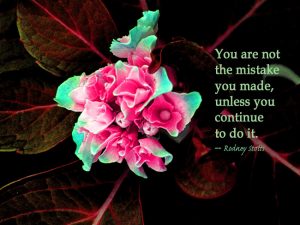– Rodney Stotts
According to the Tessian Report, “a mistake is a decision or action that produces an unwanted or unintentional result. As emotional beings, humans make mistakes because we cannot always make objective decisions … Because of this, we sometimes make decisions that are suboptimal.” In addition, Kathryn Schulz adds, “The kinds of things that we can make mistakes about are essentially unlimited.”
Okay. But some blunders hurt. They haunt, like the pain I feel at choosing to maintain my excellent, eighth-grade attendance record rather than walking my dog home [two miles] and securing her. I thought my little, Cocker Spaniel mutt would wait for me outside the school. I never saw Lady again.
A vagabond once sat beside me at a bus stop and asked for a doughnut from the bag I’d just bought. My 33-year-old self was offended. I still regret my huffy, tiny-hearted stinginess.
In “7 Reasons Why It’s OK to Make Mistakes,” The Odyssey Online says, “Every mistake … is a valuable lesson gained.” They add, “Your mistake doesn’t define you. … It simply makes you human.”
Quora answers the question, What happens when we make mistakes, with: “To be brief we learn our lessons if mistakes are not deadly or fatal.”
Okay. A flub, foul-up, fumble or foolishness is survived. A lesson learned. But remorse, regret, pain persists. What to do?
Consider:
Time passes unhindered. When we make mistakes, we cannot turn the clock back and try again. All we can do is use the present well. — Dalai Lama
We are built to make mistakes, coded for error. — Lewis Thomas
We’ll just have to try to make better mistakes tomorrow. — Alexandra Bracken
We all make mistakes, but one of our biggest mistakes is continually revisiting the past. — Bryant McGill
This post opens with Rodney Stott’s words about mistakes.
See this former drug dealer’s story [3 minutes]
Support Stott’s work, The Earth Conservation Corps’ Anacostia Raptor Watch
Buy his book, Bird Brother, A Falconer’s Journey

Story Talk
In Saving Grace, a woman flies to England to escape toxic experiences. Here’s how a British doctor describes her medical care,
“Do you know,” shaking his head in disgust, “95 percent of those types of medications are prescribed in America? And America only makes up five percent of the world’s population. … In 1996, the rate of diagnoses for Bi-Polar Disorder was one in 20,000. And do you know what it is today in America? One in twenty. And they think it’s going up to one in ten [because] the drug companies are pushing these terrible drugs.”
Saving Grace, by Jane Green: A riveting novel about one woman’s journey to save her family―and herself [Amazon]
Shop Sandra’s Gallery

This image was processed Adobe PSE 2014. It’s striking, surreal effect was achieved using the Watercolor Filter, made more vibrant with enriched color saturation and lighting.
Art available with or without text, framed, on canvas, as posters as well as tote bags, tee shirts, journals, puzzles, phone cases, ornaments, face masks, towels, blankets, cups, pillows, shower curtains and more
Shop All Art and Collections HERE.






